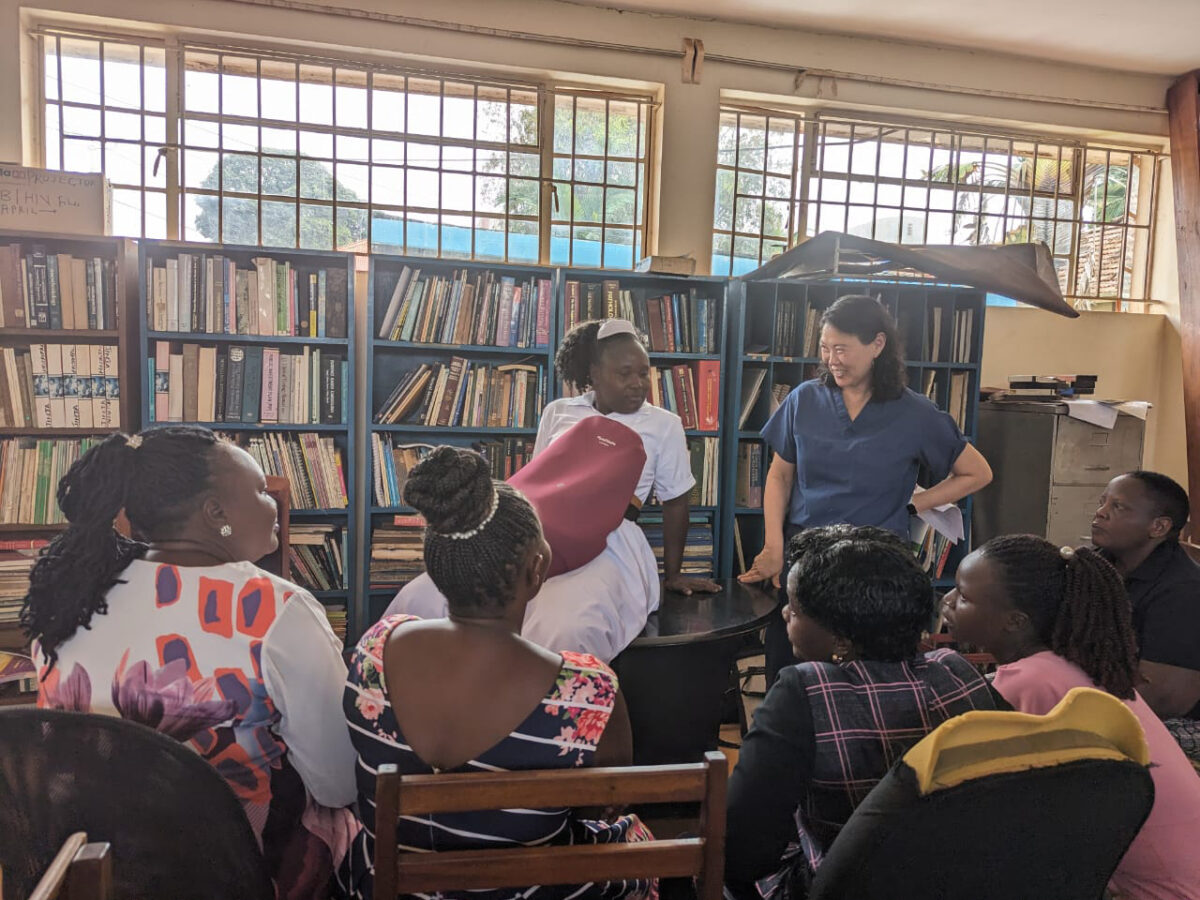Alumna delivering hope in Africa

Dr. Cathy Han ’87 is on a mission to reduce maternal deaths during childbirth.
Dr. Cathy Han ’87 arrived in Uganda in January 2024 with a full-size pregnant mannequin on her back and a plan to teach 40 local midwives how to respond to obstetrical emergencies. For the midwives, it would be an opportunity to learn through hands-on training and simulation drills rather than the standard didactic classroom teaching. For Han, who was fulfilling the practicum requirement of her master’s degree program at the Harvard T.H. Chan School of Public Health, the visit was a lesson in inequality, and in resourcefulness.
Although she and her collaborator, a fellow student and midwife, had been assured in advance that the large regional hospital where they were assigned was well equipped, on arrival they found that was not entirely true. “We were really humbled because we were teaching them these protocols and we’d say, ‘You’ve got to use five different medications,’ and they might have one of them,” Han says. “We were trying to address a small part of the puzzle. It was eye-opening.”
Like many low-resource countries, Uganda has a medical system in need of improvements to infrastructure, equipment, personnel, medications and funding. Its maternal mortality rate is 284 per 100,000, compared to 21 per 100,000 in the United States; during Han’s one-week stay, the hospital experienced three maternal deaths that she speculates were attributable in part to a dearth of both medications and blood for transfusions. “One of the midwives jury-rigged a device for a postpartum hemorrhage — she created her own balloon tamponade with a catheter, a glove and saline,” Han says with admiration.
Not just under-resourced nations face such issues. “There are preventable maternal deaths happening in the United States today,” Han says. “Even though this is probably the most resourced country in the world, there are things we need to address.”
She is working to do just that in her new role as implementation specialist for TeamBirth, an initiative developed by nonprofit Ariadne Labs to improve communication during labor and delivery. In the interest of universal accessibility, it uses low-tech, inexpensive tools: a team huddle that includes doctor or midwife, nurse and patient; and a whiteboard in the patient’s room on which to write their preferences, team members and anything noteworthy related to the delivery process.
“The goal is to elevate the patient so they truly do get heard and acknowledged,” Han says. “It’s a behavioral shift because it changes the dynamic. We’ve found it really helps women for whom English is the second language and women from minority groups who in the past have not felt like they were being listened to, especially in a hospital setting.” To date, TeamBirth has been adopted by 180 hospitals in the United States, along with several in European countries; one in Nepal is next on the list. Han is tasked with expansion in California, and is working directly with medical and nursing schools there.
It’s a world Han knows well. She left a successful obstetrics practice in Southern California — after delivering 3,000 babies over 15 years — to stay home with her three young children, all Exonians (Calvin Chai-Onn ’19, Henry Chai-Onn ’22 and Emily Chai-Onn ’25). With the arrival of COVID, Han volunteered at a clinic, administering some 1,000 vaccines and simultaneously awakening an interest in public health that she pinpoints in part to the non sibi lessons she learned at Exeter: She likewise credits Exeter with her confidence in going back to school at age 53. “I learned how to write, how to have a discussion around a table and listen, and — I know it’s a cliché — how to be a lifelong learner.”
Although she would like to see TeamBirth in use in Uganda, Han says the country has more urgent needs. She’s making plans to return, but this time will pack her suitcases more thoughtfully, filling them with basic medical supplies such as gloves and catheters donated by her local hospital.